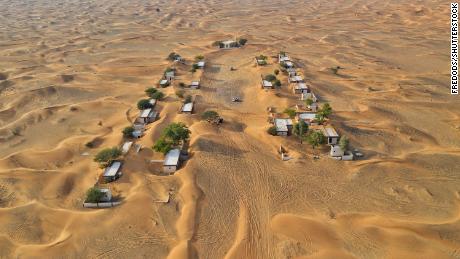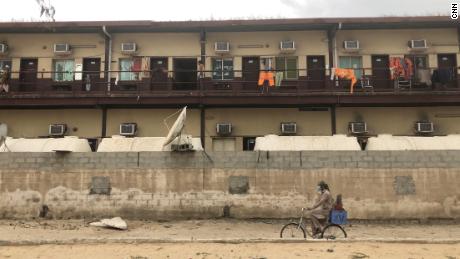Two months ago, they were laid off as Covid-19's spread dealt a blow to the UAE economy. Since then, they have been confined to their labor camp, surviving on a drip feed of monetary compensation. Manjit Singh has worked in the UAE for 17 years, enduring tough living conditions to provide a lifeline for his impoverished family back home in India. After the coronavirus started to spread this year, his employer suspended operations, leaving him in limbo. Commercial flights in the UAE were grounded, India went into lockdown on March 24, and Singh stopped receiving an income."For the past two months, we have been sitting in the room and our company was giving us a salary, but now they are saying that they cannot give us a salary and we should buy a ticket to go home, but where should we buy the ticket?" the 44-year-old told CNN. Singh is one of hundreds of thousands of migrant workers across the Gulf's Arab countries who are contending with stripped livelihoods, overcrowded camps and no easy path to repatriation, Amnesty International, Migrant-Rights.org and Business & Human Rights Resource Centre said. Laborers are also especially vulnerable to the virus, these rights groups say, and the compounds they're restricted to are considered hotbeds of the pandemic in the region.
Slow repatriations
In one labor camp on the outskirts of Dubai, hundreds of recently unemployed workers spend their days walking around the yard with their friends concocting plans to go home."I have not received the salary for the previous month … they gave 150 Rupees (around $2) for food and told us to manage," said one construction worker who CNN agreed to not identify due to his fear of punishment by his previous employer."We don't have money to eat. Sometimes the company gives money. Sometimes they give a partial amount. Sometimes no money at all," said one Indian worker who refused to be named. With the little money they still have, the men buy vegetables at a makeshift market near their housing buildings. "The company is giving us one meal a day during Ramadan. But how can one manage with one meal?" said one construction worker, referring to the Muslim holy month of fasting. Gulf countries say they are working to control the spread of the virus in these camps and neighborhoods while attending to the millions of workers who are now left unemployed and unsalaried. On May 3 in Kuwait, Egyptian migrant workers protested at a state shelter, demanding repatriation, Kuwait's interior ministry said. The Egyptian government has since said it will begin scheduling repatriation flights as early as this week.The Indian government started a repatriation effort this week for thousands of "distressed' Indians stuck abroad. Around 200,000 Indian nationals in the UAE have registered for repatriation, according to the Indian embassy, and so far more than 700 have been returned. Over 5,000 are set to be repatriated from the Gulf this week.The embassy tweeted that Indians will foot the bill of their repatriation, presenting yet another obstacle to stranded migrant workers.Some of the embassies representing the largely South and East Asian laborers in the UAE have repatriated a handful of the stranded nationals. The Philippines last month flew 494 nationals back to Manila. Pakistan has evacuated 3,928 Pakistanis out of 60,000 who registered to return, according to the Pakistani consulate in Dubai.
On May 3 in Kuwait, Egyptian migrant workers protested at a state shelter, demanding repatriation, Kuwait's interior ministry said. The Egyptian government has since said it will begin scheduling repatriation flights as early as this week.The Indian government started a repatriation effort this week for thousands of "distressed' Indians stuck abroad. Around 200,000 Indian nationals in the UAE have registered for repatriation, according to the Indian embassy, and so far more than 700 have been returned. Over 5,000 are set to be repatriated from the Gulf this week.The embassy tweeted that Indians will foot the bill of their repatriation, presenting yet another obstacle to stranded migrant workers.Some of the embassies representing the largely South and East Asian laborers in the UAE have repatriated a handful of the stranded nationals. The Philippines last month flew 494 nationals back to Manila. Pakistan has evacuated 3,928 Pakistanis out of 60,000 who registered to return, according to the Pakistani consulate in Dubai. For decades, oil-rich Arab countries in the Gulf have relied heavily on millions of migrant laborers to build their vast economies. Workers flock to these countries in search of comparatively higher salaries and work opportunities.In 2017 alone, migrants in Arab states sent home $124 billion, with the UAE and Saudi Arabia ranking second and third globally in terms of remittance outflow, according to the International Labour Organization.
For decades, oil-rich Arab countries in the Gulf have relied heavily on millions of migrant laborers to build their vast economies. Workers flock to these countries in search of comparatively higher salaries and work opportunities.In 2017 alone, migrants in Arab states sent home $124 billion, with the UAE and Saudi Arabia ranking second and third globally in terms of remittance outflow, according to the International Labour Organization.
Camps are coronavirus hotspots
As of Friday afternoon, the UAE had 16,793 confirmed cases of the virus and 174 deaths from the pandemic. Nearby Saudi Arabia has over 35,000 cases and 229 deaths. Kuwait has reported over 7,000 cases and 47 deaths while Qatar has 20,201 cases and 12 deaths.As the coronavirus spread across the region, overcrowded labor campRead More – Source
[contf]
[contfnew]

cnn
[contfnewc]
[contfnewc]





